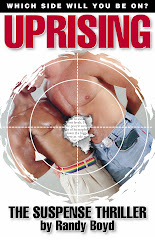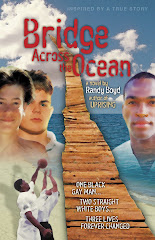 The year was 1992. Those of us living with HIV/AIDS had no real hope of surviving on anything but sheer will and determination. Some of us were pouring out our hearts with words. Some of us were just trying to live another day. Essex Hemphill was a man doing both. An acclaimed poet, Hemphill granted a fledgling reporter an interview on a sunny afternoon one brief moment in time, opening up about topics as diverse as the controversial movie Basic Instinct, white men's obsession with the black penis, and the idea that Madonna pirated her Vogue act from a marginalized community. At the time, both the poet and the reporter were living with the virus. Only one of them made it to the 21st century.
The year was 1992. Those of us living with HIV/AIDS had no real hope of surviving on anything but sheer will and determination. Some of us were pouring out our hearts with words. Some of us were just trying to live another day. Essex Hemphill was a man doing both. An acclaimed poet, Hemphill granted a fledgling reporter an interview on a sunny afternoon one brief moment in time, opening up about topics as diverse as the controversial movie Basic Instinct, white men's obsession with the black penis, and the idea that Madonna pirated her Vogue act from a marginalized community. At the time, both the poet and the reporter were living with the virus. Only one of them made it to the 21st century.I have no idea why Essex didn't survive and the reporter did, but I feel privileged to present and digitally preserve that interview, as published in the July 3, 1992, issue of Frontiers magazine (thank you, editor David Kalmansohn). Energies live on.
Ceremonies and Young Men
Interview with Essex Hemphill
His honesty is brutal. No time for shame. The intensity of his fluid images has led people like Martin Duberman to compare him to “an Old Testament prophet exhorting us with ethical passion.” A one-time National Endowment for the Arts fellowship recipient who now lives in Philadelphia, Essex Hemphill has authored two books of poetry, Earth Life and Conditions, as well as editing Brother to Brother: New Writings by Black Gay Men, stepping in when original editor Joseph Beam died. His new book, Ceremonies (Plume, $10), is solely and purely Essex. It represents the culmination of his rise as a major player in the black and gay literary worlds. Through poetry and prose, he tackles urban life and the black gay experience, from straight homeboys having sex with white men to Robert Mapplethorpe objectifying the black man's penis. It's a collection that doesn't mince words. At 35, Essex Hemphill doesn't have time to mince words. He's HIV-positive.
His new book, Ceremonies (Plume, $10), is solely and purely Essex. It represents the culmination of his rise as a major player in the black and gay literary worlds. Through poetry and prose, he tackles urban life and the black gay experience, from straight homeboys having sex with white men to Robert Mapplethorpe objectifying the black man's penis. It's a collection that doesn't mince words. At 35, Essex Hemphill doesn't have time to mince words. He's HIV-positive.Boyd: One of your running themes is making the black gay man a visible entity in the black and gay communities. Has that happened yet?
Hemphill: It's happening and it's been a long time coming. In a literary sense, it's happening in a tremendous way, the numbers of [black] men who are for the first time struggling with creating poems or fiction of their experiences. And this is all in the context of confronting AIDS and the deaths around us. It's almost like a fierce resistance that says, “Before I die, I'm going to say these things.” That's why Brother to Brother picking up the Lambda Literary Award [for best gay anthology] wasn't an award for me to take sole satisfaction in. It's an award that goes to 37 men who were willing to come forth, [even] posthumously. We're trying to say everything we can.
a tremendous way, the numbers of [black] men who are for the first time struggling with creating poems or fiction of their experiences. And this is all in the context of confronting AIDS and the deaths around us. It's almost like a fierce resistance that says, “Before I die, I'm going to say these things.” That's why Brother to Brother picking up the Lambda Literary Award [for best gay anthology] wasn't an award for me to take sole satisfaction in. It's an award that goes to 37 men who were willing to come forth, [even] posthumously. We're trying to say everything we can.
Boyd: To what do you attribute the creative explosion? a tremendous way, the numbers of [black] men who are for the first time struggling with creating poems or fiction of their experiences. And this is all in the context of confronting AIDS and the deaths around us. It's almost like a fierce resistance that says, “Before I die, I'm going to say these things.” That's why Brother to Brother picking up the Lambda Literary Award [for best gay anthology] wasn't an award for me to take sole satisfaction in. It's an award that goes to 37 men who were willing to come forth, [even] posthumously. We're trying to say everything we can.
a tremendous way, the numbers of [black] men who are for the first time struggling with creating poems or fiction of their experiences. And this is all in the context of confronting AIDS and the deaths around us. It's almost like a fierce resistance that says, “Before I die, I'm going to say these things.” That's why Brother to Brother picking up the Lambda Literary Award [for best gay anthology] wasn't an award for me to take sole satisfaction in. It's an award that goes to 37 men who were willing to come forth, [even] posthumously. We're trying to say everything we can.Hemphill: You can sit back and see that the momentum has been building. The motivation is to represent ourselves. We're still hungry. I'm hungry still. I know that's why I write and keep writing.
"The protest around [Basic Instinct] was misdirected. The argument needed to be larger than just the representation of lesbians."Boyd: You've said that in gay culture, blacks are mostly looked upon as “the big black dick,” and you've called for blacks to return to the black community from whence they came instead of trying to be part of a gay community that never wanted them in the first place. Are you suggesting blacks separate themselves?
Hemphill: [He laughs.] Not necessarily. The return I call for is so we can do the work that no one else can do for us. The white lesbian and gay community can't come in and interrogate our black churches about the homophobia. We have to do that. We're already singing in the choirs, we're already on the usher boards, but then to accept homophobic diatribes from the podium ... I'm not expecting the white community to interrogate black intellectuals, writers and cultural activists about their homophobia. We have to do that first, and the only way we're going to do that is to really consider and understand how important that home space is for us.
Boyd: So black gays need to break the silence in their own black communities?
Hemphill: First and foremost. It's crazy and rude and wrong to expect white people to do that for us.
Boyd: Most would agree to the principle that the more united gays are, the more powerful they become. Can black and white gays unite yet remain individual?
Hemphill: Let me give you a parallel: I went to see Basic Instinct--
Boyd: Did you pay for it?
Hemphill: And I paid for it and rightfully so because [the issue continues to come up]. And I was disappointed. I think the protest around it was misdirected. The argument needed to be larger than just the representation of lesbians. It needed to be, “We're sick and tired of the representation of women coming out through Hollywood and the popular media—period.” Then we have the potential to work with numbers of communities that are also sick and tired, be it lesbian women, black women, working-class women. That's your protest. That's the way we have to begin to deal with each other.
 Boyd: In the title story in Ceremonies, you talk about the oppression you faced from your so-called straight black friends. What advice would you give to a black kid who is facing that same kind of homophobic bravado you endured?
Boyd: In the title story in Ceremonies, you talk about the oppression you faced from your so-called straight black friends. What advice would you give to a black kid who is facing that same kind of homophobic bravado you endured?Hemphill: I'd give him In the Life, Tongues Untied, The Road Before Us, ... that's what this is all about. Joseph [Beam] talked about making ourselves from scratch. There's not been a precedent in history for this time, not just for us as black gay people but for any of us moving through lesbian and gay and bisexual experience and politics. All of us are constructing lineage and antecedents from various places. because the silence has been so deep and unyielding, we really represent the beginning of it all, the beginning of no masks, from Stonewall forward, and each decade we're throwing away more masks.
Boyd: Speaking of no masks, you're very open about your HIV status.
Hemphill: One has to be, I think, to a certain extent.
Boyd: How has that made your life different?
Hemphill: It's been more internal than external for me: How do I date, how do I fuck, how do still see myself as being worthy and beautiful, yet I'm infected?
Boyd: How do you negotiate all that?
Hemphill: It's ongoing. It's something I haven't even begun to really articulate yet. At the most I've come forth in the public space and said, “Yes, I am too,” and I've said that because other men have come forth. Joseph [Beam] already showed us one way, and that's not the way I want to go, with the secrecy—though I don't judge him for that.
Some of [my dealing with HIV] has been leveling it, so I'm not out there all psychotic and crazy, you know, “I”m gonna die in a minute, move out of the way.” No, it's just one more thing, dear, and you will live. You just have to pay more attention. You can't run out every night and suck up all the liquor in the bar and drag home every boy. Not that you ever needed to be doing all those things—but we have our moments.
Boyd: How is your health?
Hemphill: It's pretty good. I've had mild disturbances, but I've been fortunate so far, and that is the qualifier: so far.
Boyd: Is there anyone special in your life?
Hemphill: There's things happening in the air. [He laughs.] I am trying to be happily married. I'm not tired of being alone; I rather like alone. I've always been a loner so I have no problem keeping myself busy. But there are intimacies I want to share with another person.
“'Oh, I want to suck your big nigger dick.' Who the fuck wants to hear that?"Boyd: In Ceremonies, you criticize Madonna for pirating voguing, for not crediting black gays. But hasn't she already done a lot for blacks and gays in her act?
Hemphill: But that's just an act. That's just window dressing.
Boyd: What should she have done?
Hemphill: I don't know what she should have done, other than acknowledge more forthrightly that, “I've taken this from this transgressive community composes of Puerto Ricans and blacks who see themselves marginalized in society.”
Boyd: Most artists don't credit the people they steal from.
Hemphill: But Madonna's not like most artists. Madonna's a white artist who's appropriated and pillage from a marginalized culture and there's a long history of that already and that's what's hard to reckon with. Think about the fact that nobody black benefits from all the Billie Holiday [records] we buy because Billie Holiday left no black heirs. So what does Columbia doe with that money? I don't hear them saying, “We set up a program specifically under her name for the black colleges or the music schools in this country.” There's an accountability, that's all I'm challenging.
Boyd: You've criticized the late Robert Mapplethorpe for lopping the heads off black men in his photos, thereby presenting the black man as a mindless sexual object. Would you have been satisfied if he had included faces?
Hemphill: I would have probably challenged it less. He for me represents how I interacted with the white gay community, even in the bathhouse situation, having to hear, “Oh, I want to suck your big nigger dick.” Who the fuck wants to hear that?
Boyd: Are there any white artists our there who do the black man justice?
Hemphill: That's a good question given that I've been more concerned with black art. I guess I'm already doing the very thing I'm articulating—turning my gaze inward, back onto us—so that's cutting out a certain level of concern about other people's representations of us.
Boyd: Are you optimistic about the future?
Hemphill: It's incredible to think about being alive. I'm thankful for every day I get up, every day I affirm myself when I awaken—which doesn't mean that I rush to the mirror and say, “I'm here,” but it's a deeper affirmation that I give myself.
It's wonderful meeting this [new influx of black artists]. It's witnessing many of the things I did not know would come to pass. This work we've been doing is having an impact. It's inspiring. It's getting people to stop and think.
- Randy Boyd is five-time Lambda Literary Award finalist and the author of Walt Loves the Bearcat, the epic sports novel, and three other books. In addition, Randy's fiction has appeared in Blackfire magazine, as well as the following anthologies: Certain Voices (Alyson Books); Flesh and the Word 2 (Plume); Sojourner: Black Gay Voices in the Age of AIDS (Other Countries); Flashpoint (Masquerade Books), MA-KA: Diasporic Juks (Sister Vision); and Freedom in this Village: Black Gay Men's Writing 1969 to the Present (Carroll & Graf). His nonfiction has been featured in the Indiana Word, Frontiers, Au Courant, The Washington Blade, The James White Review, The Gay and Lesbian Review, The Lambda Book Report, BeyondChron.com and the anthology Friends and Lovers: Gay Men Write About the Families They Create (Dutton). Randy is also a contributor to Outsports.com and the publications of the Black AIDS Institute.
Essex Hemphill on Wikipedia
Essex Hemphill on Poets.org
Tribute to Essex Hemphill
Books by Essex Hemphill on Amazon.com














